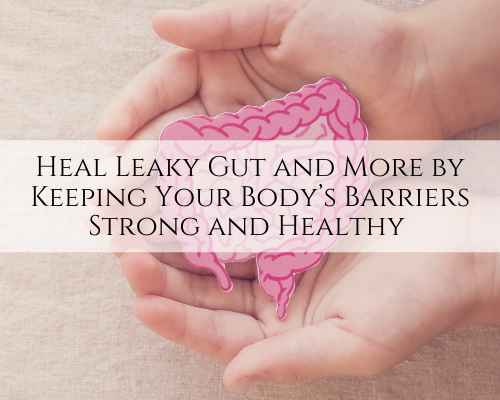Building Our Barriers – How to Get Rid of Seasonal Allergies, Leaky Gut, Skin Problems, Brain Fog, and More
Your body has barriers that act as shields. These protective barriers make sure your immune system isn’t getting overexposed to substances we encounter daily. Some of these things the body should perceive as harmless such as the food you eat or plant pollen. But when the immune system is constantly exposed to these substances, the body can react and become ill. The body’s barriers are also set up to protect us from innately harmful substances such as chemical toxins.
If your barriers are over-reacting to foods and pollens, it means the barriers aren’t as healthy as they should be. They may have an imbalanced response to things they’re exposed to daily. This shifts how your immune system functions.
When your barriers become overreactive, it can lead to autoimmune disease, sinus problems, leaky gut, skin problems like eczema, and brain fog. An autoimmune doctor, especially a functional medicine provider, can work with you to boost the strength of these barriers, stop them from overreacting, and reduce their impact on autoimmunity. But you can also take some steps on your own. In this blog post, you’ll discover:
- What barriers are and why they matter
- How they can become overreactive and cause a variety of health problems, and
- What you can do to strengthen your barriers to decrease autoimmune symptoms and improve vitality, energy, focus, and attention. By strengthening your intestinal barrier, for example, you’ll be able to tolerate more foods that you reacted to in the past.
Intestinal Barrier Is Involved in Leaky Gut Repair
The intestinal barrier is one of the most important barriers in your body. Think of this barrier like a cheesecloth. It’s incredibly fragile—only one cell layer thick. That’s because while stopping harmful substances from escaping into the bloodstream it must also allow beneficial nutrients to get in. When this barrier isn’t working right and becomes overreactive, leaky gut is the result.
Between your intestinal cells are tight junctions. These tight junctions act as gatekeepers. When these tight junctions open, leaking gut is the result. During leaky gut, substances escape into the bloodstream. Some of these substances can be innately harmful like bad bacteria. Other substances like undigested food particles become harmful when they leave the intestines and travel throughout the circulation where they don’t belong. This causes inflammation throughout the body, which in turn, may contribute to autoimmunity problems.
Sometimes, the way our intestinal barrier is affected by food is an immune reaction. But certain foods, like the gluten protein, are simply hard to break down. This causes these little tears in the gut cells, which in turn causes leaky gut. Gut cells are exposed to constant wear, tear, and damage because we’re eating all the time. They do replace themselves every three to five days, but if they’re constantly exposed to stressors you don’t have enough healthy cells to replace old damaged ones. This constant turnover of unhealthy cells is why leaky gut doesn’t go away. If you remove as many of the stressors to the intestinal barrier as possible you can then give it a chance to fully heal.
Leaky gut has been well studied and the same principle applies to every other barrier in the body. All of the barriers have epithelial cells and tight junctions. If the barrier becomes leaky, all sorts of problems can arise. Let’s look at some of the other barriers important for your health.
How to Get Rid of Seasonal Allergies and Other Sinus Problems
Your sinuses depend on a healthy barrier, too. A mucosal barrier in the nasal cavity stops allergens, bacteria, fungi, and viruses from getting into the body. But when it’s not working right, the result is seasonal allergies, bacterial or fungal infections, inflammation in the sinuses, and respiratory illnesses like a cold or flu. The best way to protect your mucosal barrier in the nasal cavity is to minimize its exposure to allergens and inhaled chemicals. We’ll go more into minimizing exposure later in this blog post.
Eczema and Skin Problems
Your skin is a large barrier that keeps chemicals, toxins, allergens, and bacteria out of your body. It’s often the first line of defense against unwanted substances. The skin barrier is a lot thicker than the gut barrier because it’s not meant to absorb nutrients. But the same principles apply. When the skin is exposed to stressors like toxins or lotions or soaps with irritating ingredients, cell junctions are weakened and your skin becomes vulnerable. This can lead to everything from eczema to an autoimmune skin rash.
Losing Tolerance, Gaining Unwanted Health Problems
Our immune system’s job is to protect us from infections while helping us tolerate the outside world. If you have an autoimmune disease, sinus problems, or skin reactions, our goal is to help your body gain immune tolerance. In other words, the body should be able to tolerate its own tissues as well as allergens, chemicals, and food without developing symptoms. When there’s a barrier breakdown and a resulting immune system shift there’s a loss of three types of tolerance:
- Loss of self-tolerance – This refers to autoimmunity. Your immune system should be able to come into contact with different tissues and organs in your body without thinking they’re harmful. A loss of self-tolerance means the immune system mistakenly thinks specific parts of your body are foreign and harmful and attacks them.
- Loss of chemical tolerance – If you smell gas fumes at a gas station and then get a headache, that’s loss of chemical tolerance. Or if you’re walking by a store that sells perfumes or scented candles and you get a headache or some other unpleasant reaction in your body, that’s also a loss of chemical tolerance.
- Loss of oral tolerance – Food sensitivity is an example of loss of oral tolerance. Our immune system is wired so that it doesn’t attack harmless proteins like common foods. However, if you eat a certain food and get a flare-up in your joint pain, that’s a loss of oral tolerance. Your body isn’t tolerating the food you’re eating, which is triggering an inflammatory response.
You can lose tolerance when your barriers are getting overexposed to a substance or if barrier function is weakened by excess stress or inflammation.
What Damages Your Barriers?
Several factors can compromise your barriers and leave you open to a whole host of health problems, including a leaky gut. Some of the reasons your barriers aren’t working their best include:
- Breathing in chemicals like fake perfumes or scented candles
- Using lotions and personal care products with chemicals
- Infections
- An imbalance in your microbiome, the collection of organisms—both good and bad—that reside throughout your intestines, respiratory tract, and other areas of your body. This imbalance can be caused by taking antibiotics, eating meat that’s been fed antibiotics, or even chronic stress.
- Hormone fluctuations
- Anything that causes chronic inflammation such as food sensitivities or hard-to-digest foods
- Nutrient deficiencies and eating the standard American diet (SAD)
- Physical injury or anything that causes tissue destruction and immune activation
- Stress and emotional trauma
Stress is an especially common reason why our barriers break down. Our modern society is fast-paced and stressful. Chronic stress leads to excess levels of the stress hormone cortisol. You need some cortisol. It’s produced during your body’s response to stress. When it drops right back to normal after the stress is done, cortisol is anti-inflammatory. It’s a good and necessary thing. However, when cortisol levels don’t fall after stress, inflammation increases. This can lead to tissue breakdown and barrier problems. This role of cortisol in chronic stress is one reason we call it a “wear and tear” hormone.
How to Heal Leaky Gut and Other Barrier Problems
The first step? Figure out what is harming your barriers. This won’t be the same for everyone. Your environment, your triggers, what you’re eating, and how you’re handling stress will all play into how strong your barriers are. You can work with a functional medicine autoimmune specialist to pinpoint likely causes. Or you might have some ideas of your own.
Once you’ve identified the causes of your barrier problems the key is to remove as many of the root causes as you can. This will give the body the energy to heal your barrier dysfunction. For example, getting rid of the root causes of barrier breakdown might include:
- Minimize exposure to allergens by using a neti pot twice a day to rinse out the sinus cavity.
- Install air filters in your house to decrease the allergen load.
- Eat a gut-healing diet rich in vegetables and low in sugar to resolve nutrient deficiencies.
- Use only personal care products and candles that have natural ingredients.
- Find ways to cope with stress such as meditation, yoga, and exercise.
- Take a probiotic for healing gut dysbiosis (an imbalanced microbiome)
Reducing or removing the root causes of barrier damage can help to heal your barrier, improve your immune function, and get you feeling good again.
Board Certified in Integrative Medicine
Certified Functional Medicine Practitioner
Institute for Functional Medicine Certified Practitioner






